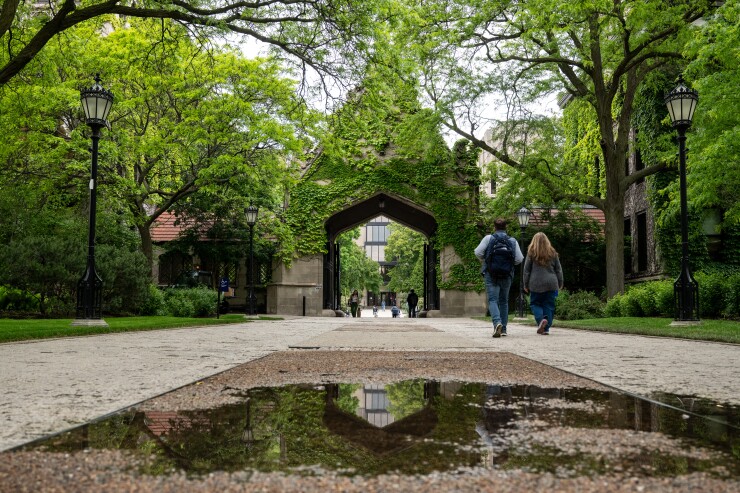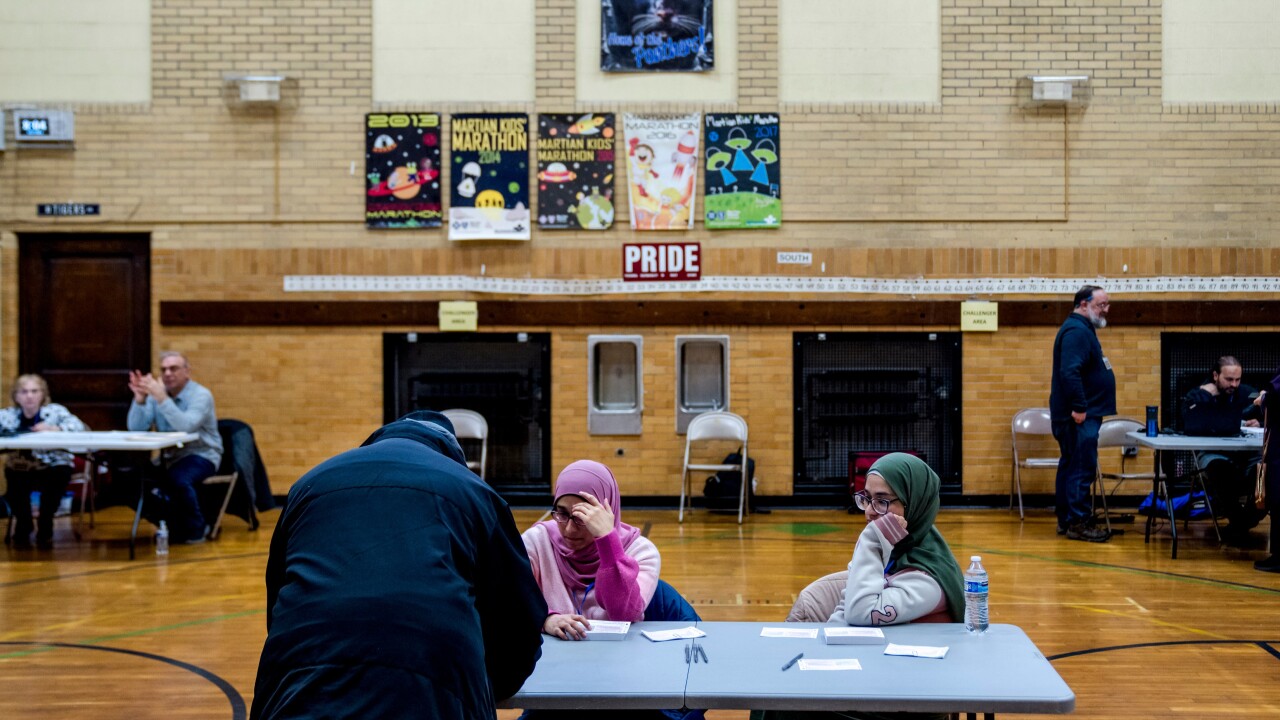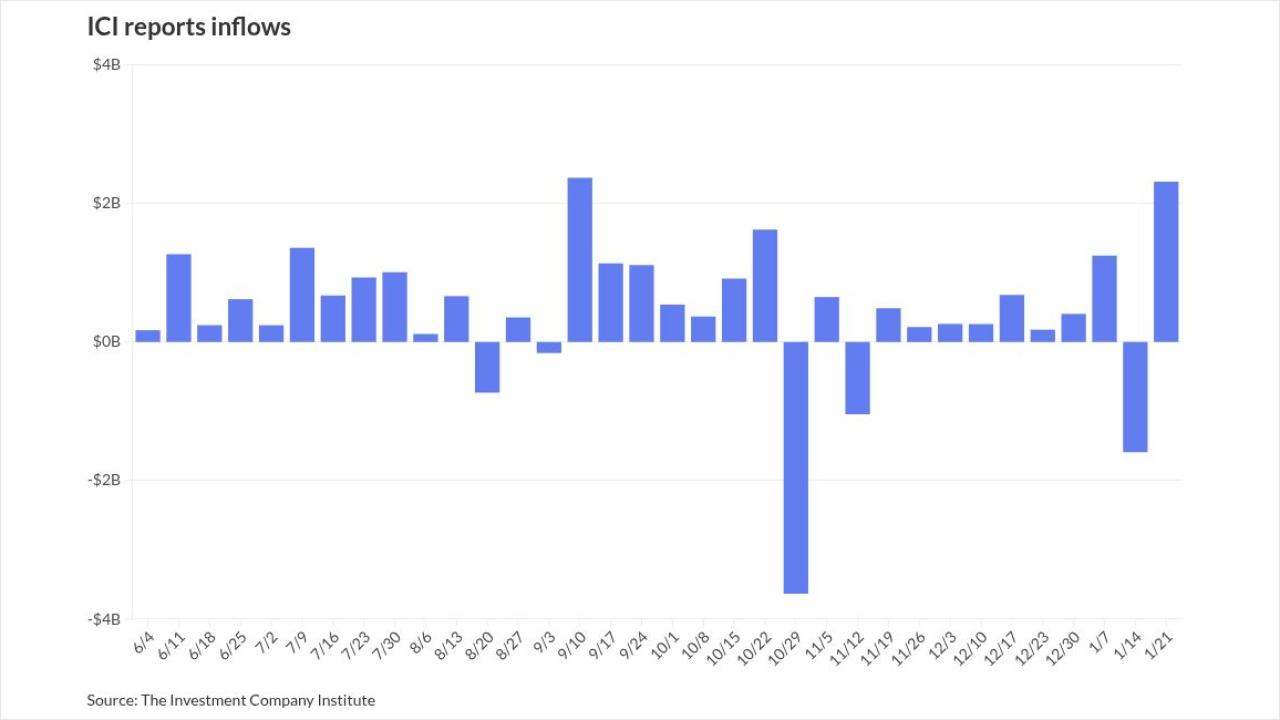
The University of Chicago went to market this week, at a time when the Trump administration has been targeting higher education and when the university faces faculty criticism for budget and program cuts.
RBC Capital Markets priced the $253 million refunding deal to yield from 2.4% for a 2027 maturity to 3.48% for the 2035.
The Illinois Finance Authority is conduit issuer.
Proceeds will refund tax-exempt and taxable bonds issued between 2014 and 2021, according to an online investor presentation.
The municipal advisor on the deal was the Yuba Group LLC, and bond counsel was Chapman and Cutler, LLP, according to the preliminary official statement.
The university's finance team did not respond to a request for comment.
Tuesday's bond sale comes after the university went to market in July with roughly $200 million of variable-rate bonds.
The university has about $6.5 billion of pro forma debt outstanding, and another $1.6 billion at its medical center and the Woods Hole, Massachusetts-based Marine Biological Laboratory.
Ahead of the deal, ratings of Aa2 from Moody's Ratings and AA-minus from S&P Global Ratings were affirmed. Those outlooks are stable. Fitch Ratings assigns its AA-plus rating with a negative outlook.
The university plans to issue around $300 to $500 million in additional debt over the next two years, according to S&P Global Ratings.
"If you just look at their past years' capital spending, year to year, that's (consistent) with their typical spending patterns," said Michael Osborn, vice president and senior credit officer, public finance, at Moody's. "It's not an amount that sounds out of line with past investment."
Osborn said the university's leverage profile remains a key challenge.
"They do have a lot of debt relative to their wealth, relative to the cash flow they generate," he said. "But from a wealth to expenses perspective, they fall in line nicely with their peers."
Jessica Goldman, a director in S&P's public finance division, said by email that the university has shown potential for balance sheet growth due to recent fundraising success and operating improvements. But she noted the potential additional debt "could strain the balance sheet absent financial resource growth, as metrics are already below medians for the AA and A category."
The new debt comes as the Trump administration is threatening universities on multiple fronts, including research funding and international students enrollment. The University of Chicago is in the top 15 universities most dependent on international students for tuition revenue, with 31% of its enrollment composed of international students, according to the
The university is also facing criticism from some faculty over its strategic direction. Last week, Clifford Ando, Robert O. Anderson distinguished service professor of classics and history at the university,
Ando said he learned of the enrollment expansion plans from multiple sources, including a written report from a colleague on a briefing to department chairs.
At the same time, the university's Arts and Humanities Division is
The American Association of University Professors at the university
"We are disturbed by the long-term trend of university disinvestment from the arts and humanities," the letter said. "These are fundamental areas of scholarly inquiry, not merely ornaments adorning the 'real business' of the university."
Ando, not listed among the AAUP letter signers, told The Bond Buyer investors and credit rating agencies should scrutinize the university's endowment draws more closely.
"I say that for two reasons," he said. "The first is that the endowment draws are highly unusual and have had the effect, since 2021, of diminishing the value of the endowment and therefore diminishing the future purchasing power of the endowment. The endowment payout is a significant portion of the university's overall revenue. And it's very clear that we have simply elected to damage that source of revenue in significant ways."
Ando warned the university will suffer reputational damage that will dent its appeal to students.
"The international students are a huge point of vulnerability," he added.
"We are watching sector headwinds and the potential impact on the university," S&P's Goldman said. "A few issues we're monitoring are the research funding and international student enrollment exposure. To date, there have been limited reductions in the university's $561 million total grants and contracts… and there is evidence of stability in its international student population."
She said the university faces persistent operating deficits, and S&P expects the losses will continue in the next couple of years.
Of the university's "modest" monthly liquidity, Osborn said: "These universities that have hospital operations in addition to academic and research operations… the wealth doesn't go as far."
Through the University of Chicago Medical Center, "the university is exposed to potential operating and revenue pressures from its healthcare operations," Moody's said in its rating release.
The university "should identify priorities based on first principles and fulfill those as best it can while controlling costs until it can bring debt down, and bring cash used in operations into alignment with revenue," Ando said.
Ando further suggested the university freeze expenses at fiscal 2025 values. It should negotiate a freeze on spending from restricted endowments until its financial situation improves, he said, and cut unnecessary capital expenditures, among other things.
The university said in its POS that "the current federal executive administration's economic, tax, and health care policies could have a significant impact on the health care industry and the Medical Center," but Osborn of Moody's said there have not yet been any material, targeted funding withdrawals from the university itself.
"We haven't made any rating changes yet based on evolving federal policy, but it's top of mind and we continue to monitor it. It could have credit implications for universities down the road," he said.
"These highly rated universities have a lot of wealth, they have strength in their balance sheets, and they can weather some unknowns over the near term," he added. "But we'll see how this plays out over the longer term."
A deal for the university
Jessica Lerner contributed reporting.





